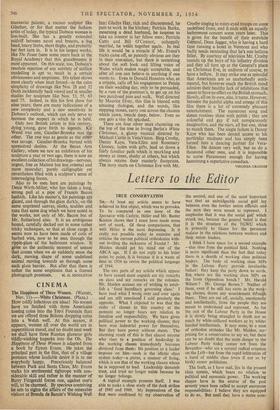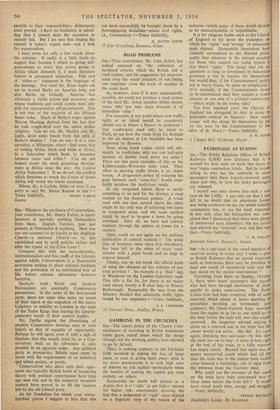Letters to the Editor
TRUE CONSERVATISM SIR,—At least my article seems to have- achieved its first object, which was to provoke. To be compared in one issue of the Spectator with Carlyle, Hitler and Mr. Buster Keaton shows that I must have made some sort of mark. Of these comparisons, that with Hitler is the most depressing. Is it really not possible today to examine and criticise the current political orthodoxies with- out inviting the nickname of Fascist ? Mr. Maiden should get his mind out of the ABCA age. If I do not reply to his letter point by point, it is because it is a waste of time in 1954 to revive the political language of 1944.
The two parts of my article which appear to have caused most anguish are my remarks on class and my remarks on the colonies. Mr. Maiden accuses me of wishing to estab- lish a fixed hereditary governing class.' I have read what I wrotq over and over again and am still convinced I said precisely the opposite. What I objected to was that the order of classes in this country at the moment no longer bears any relation to function and responsibility. We have given political power to the working classes; they have won industrial power for themselves. But they have power without status. The alarming result of this is that almost anyone who rises to a position of leadership in the working classes immediately becomes divorced from them : his position as a leader imposes on him—such is the idiotic class system today—a ,status, a manner of living, which is not that of the working classes whom he is supposed to lead. Leadership demands trust, and trust no longer exists because he no longer belongs.
A topical example presents Itself. I was able to make a close study of the dock strikes of 1945 and 1949. My impressions of the first were confirmed by my observation of the second, and one of the most important was that an unbridgeable social gulf lay between even the lowlier union officials and the men they were meant to represent. I emphasise that it was the social gulf which struck me, because the general belief is that it is the structure of the TGWU which is primarily to blame for the persistent malaise in the relations between workers and their union leaders.
I think I have space for a second example —this time from the political field. Nothing Is more significant than the fact that today there is a dearth of working class political leaders. The body of working class MPs in the Labour Party provide invaluable ballast: they keep the party down to earth. But where are the working class MPs on the front Opposition bench ? Mr. Harold Wilson ? Mr. George Brown ? Neither of these, even if he still has roots in the work- ing classes, draws any nourishment through them. They are cut off, socially, emotionally and intellectually, from the people they are meant to understand and represent. As for the rest of the Labour Party in the House it is slowly being strangled to death not so much by white-collared workers as by white- handed intellectuals. It may seem, to a man of orthodox attitudes like Mr. Maiden, sur- prising for a conservative to say so, but there can be no doubt that the main danger to the Labour Party today comes not from the Bevanitcs—who are a normal radical eruption on the Left—but from the rapid infiltration of a _band of middle class (even if not so by
birth) career politicians. -
The fault, as I have said, lies in the present class system, which bears no relation to political and economic power. The working classes have in the course of the past seventy years been called to accept enormous responsibilities: I believe they are equipped to do so., But until they have a status corn-
parable to their responsibilities, disharmony must prevail. I isave no hesitation in admit- ting that I cannot state the measures to remedy this. But I am sure that finding the remedy is today's urgent task—and a task for conservatives.
I have room for only a few words about the colonies. It really is a little facile to suggest that, because I object to giving self- government to every tiny native group in Africa which demands it, I must therefore believe in permanent subjection. This sort of 'either-or' argument is the language of the hustings. Nor need Mr. Brian Inglis ask me to re-read Burke on America (why not also Burke on Ireland). America was obviously a viable nation aid moreover one whose traditions and social system were suit- able for representative self-government. This is not true of the majority of the African States today. Much of Burke's anger against Warren Hastings derived from the fact that he rode rough-shod over the native Indian religions. Can we not, Mr. Maiden and, Mr. Inglis, draw some lesson from this part of Burke's wisdom ? Can we not—it is a con- servative, a Milncrian, object—find some way of uniting Africa, black and white in Africa, in a federation which leads to harmony between races and tribes ? Can we not inspect closer the most promising develop- ment in Africa since the war: the Central Africa Federation ?, If we do not, the conflict which threatens to wreck the Union of South Africa will wreck the whole continent.
Where, Sir, is Carlyle, Hitler or even (1 am sorry to say) Mr. Buster Keaton in this 7--



































































 Previous page
Previous page